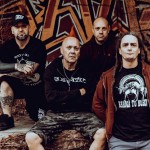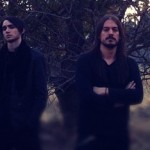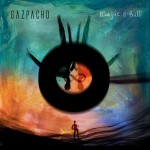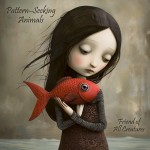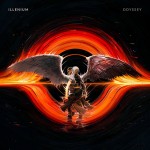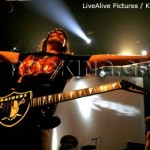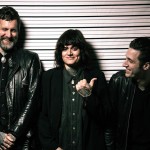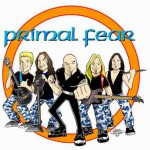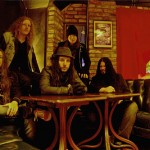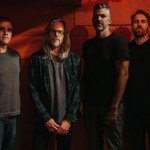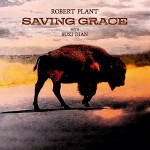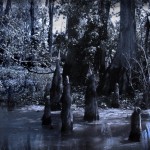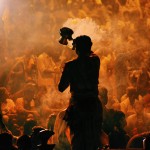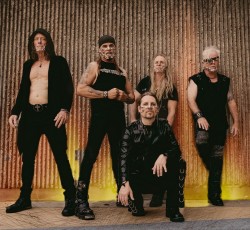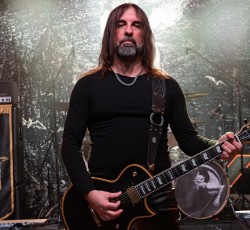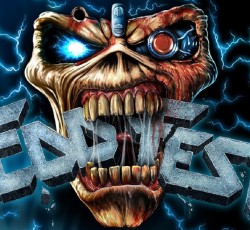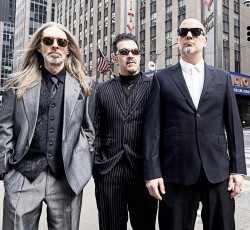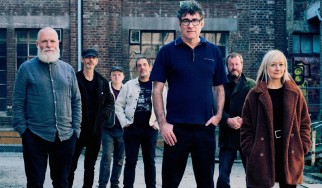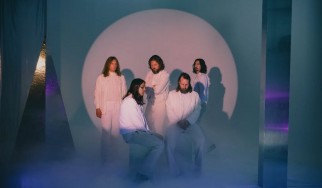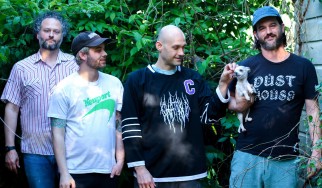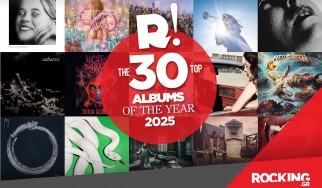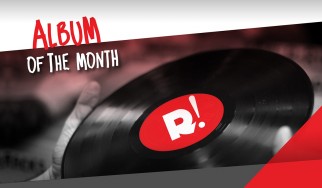Pyrrhon: "Our habitat is a noisy swirl of cracked concrete, drunk laughter, natural gas leaks, and beeping"
Vocalist Doug Moore and drummer Steve Schwegler introduce us to the labyrinthine world of one of the most important experimental death metal bands in the modern underground
Μπορείτε να διαβάσετε την ελληνική εκδοχή της συνέντευξης εδώ.
Pyrrhon are a unique band. For fifteen years, the experimental death metal group from New York has been drawing a distinct line with every release. Their latest album, the stunning "Exhaust", not only stands as their most direct work but also crowns an impressive discography. The Americans manage to blend tech-death metal with mathcore, improvisation, noise rock, and sludge-all under the lens of sharp sociopolitical commentary.
As I mentioned in the review of their impressive new album, it's remarkable how Pyrrhon give meaning to their chaos. So, what could be better in such cases than engaging with the band in order to introduce themselves to our readers, guiding us through the depths and all facets of one of the most exciting contemporary extreme metal acts? In response to our call, drummer Steve Schwegler and vocalist Doug Moore, also the frontman of avant-black metallers Scarcity (whose latest album "The Promise of Rain" was also discussed), provided us with insightful and enjoyable answers on a wide range of topics. Pyrrhon are revealed in a lengthy conversation that stretches from the American highways to cinema, and from experimental jazz to the modern extreme metal underground.

Greetings, I am Apostolis and I welcome you to Rocking.gr! Where does this interview find you? I am reading the news about the Milton situation; I hope you and your close ones are OK. Before we proceed, as a Greek, I am obligated to ask you why you picked that particular name for the band and what it means to you!
Doug: Hi Apostolis, and thanks for the well wishes. Everyone in Pyrrhon lives in the northeastern US, so we’re fortunately not much affected by the hurricane season this year so far…and hopefully things will stay that way. As for the band name, it was something of an arbitrary compromise option made with members of the band who are no longer in the lineup. The short version of the story is that we were considering "Pyrrhic Victory" as a band name but (fortunately) decided not to go in that direction. I was studying philosophy at the time and had heard of Pyrrho / Pyrrhon, so I suggested it as an alternative. The name doesn’t have much to do with what we have become as a thematic entity, honestly.
Furthermore, I have to congratulate on your amazing new album! "Exhaust" is a masterpiece! How’s been the feedback so far? Did you expect it?
SMS: The feedback has been shockingly good. We definitely didn’t expect any hype we’ve seen around it.
Doug: I don’t think we’re gonna be on the Top 40 charts any time soon, but we are definitely pleased with the enthusiastic response the album has gotten so far. It seems like it’s our best-received album at this point.
p>"We felt like coming back with more straightforward compositions and decision-making this time around
"Exhaust" comes four years after "Abcess Time". Reading the press release for the record, I noticed the theme of exhaustion as pivotal for the approach of the album. So, how much did the pandemic affect your compositional methods this time? What were you aiming with that kind of a record?
SMS: The pandemic affected our ability to hang out with each other and make music together. So as a result, that probably had some influence on the immediacy we were looking for while songwriting. That being said, the making of Abscess Time itself had an even stronger impact on our decision to put together a shorter album with shorter songs. We really stretched out in a lot of experimental directions with AT and I think we felt like coming back with more straightforward compositions and decision-making this time around.
Doug: I’d add that we all faced a lot of challenges in our individual personal lives during the pandemic, some of which were directly related to it. The strain of coping with these non-musical obstacles affected our mindset during the writing process, and at times made it difficult to get into the normal groove of practicing and writing that we were accustomed to prior to 2020. I think you can hear the consequences of shouldering those burdens in the final product.
We all feel as shattered as that pigeon sometimes

Would you like to comment on the cover of the album? What does it showcase? Pyrrhon’s artworks have always been distinct. How do you come up with the concepts and the aesthetic?
SMS: To me, the album cover is a metaphor for the daily familiarity with brutality we’ve all seen in US cities. I can drive to work in America and see a car smashed into a mangled pile with fluids spilling into the road just before I get there. Caroline’s artwork is a showcase and a representative for this shade of familiarity, which resonates with us because it’s something we all understand. The aesthetics tend to align themselves.
Doug: Put simply, I think we all feel as shattered as that pigeon sometimes. I’m not exactly sure how the original concept for this specific album cover came to me, exactly, but reviled urban animals like pigeons, rats, cockroaches, and so forth have held an important place in our iconography for years now. Once I put the basic idea in Caroline’s hands, she did the rest.
The album feels a lot more "direct", let’s say, than any of your previous outputs, yet it still contains all the experimental trademarks of your sound. When you compose, do you have a detailed plan about the song structures or are they still being shaped until the last minute?
SMS: They’re often being shaped until the last minute. There are so many small details and decisions we can make after basic song structuring is in place. That’s often my favorite part of songwriting. We’re very good at playing together now so we can decide how to accent or deviate from each other, where to let someone’s playing stick out, where to increase or decrease the energy or tempo, etc. I personally made at least five spur the moment drum decisions while tracking the album that occurred to me in the moment.
Doug: Historically, an individual member would usually write an overall "skeleton" for a song on guitar or bass, and bring that to the band so we could flesh it out as a group. We’ve been gradually moving away from that approach for a while, and relying more on on-the-spot group composition during rehearsal. The new album is about half and half, but even the songs that were initialized by a single member were much more heavily revised during practices than they would’ve been in the past. So even though the songs were mostly planned out by the time we recorded, the actual compositional process itself was quite spontaneous. And as Steve mentioned, we always leave some room for spontaneity at the moment of performance.
We don’t set out to improvise before writing a song. The energy of the composition carries us there first
Furthermore, while more spontaneous and "direct", "Exhaust" still demonstrates some outstanding improvisational parts, like in songs "Stress Fractures", if I am not mistaken. How do you come up with those moments?
SMS: The initial decision to improvise is entirely based on feel and requires basic song structuring first. We don’t set out to improvise before writing a song. The energy of the composition carries us there first and we often say out loud "You know what? I think we should go free here. Here’s how we can get in and get out of it…" and we figure out our cueing and signaling. "Stress Fractures" was one of our "band retreat" songs and it already felt loose and wild enough that improvisation made perfect sense to use.
Jazz has certainly had some general effect on my way of thinking about music
At this point, I have to ask. Are there any major jazz influences in the album? Any favorite albums you would like to share with our readers?
SMS: Definitely, we all admire good jazz music. Lately I’ve spent time listening to Herbie Hancock, Hermeto Pascoal and Jamie Saft. Live jazz music in Philadelphia was great last year; I went to see Yussef Dayes, Brandee Younger, Miles Okazaki and other greats in 2023 prior to recording Exhaust. They definitely influenced me and I recommend all of those artists. As for a favorite record? Top of my head I’d say go check out Yussef Kamaal’s Black Focus.
Doug: We’re all jazz fans to one degree or another, but none of us has any formal jazz education. Personally I do not think my own contributions to the band have anything to do with jazz, but listening to jazz has certainly had some general effect on my way of thinking about music. In terms of recommendations a little off the beaten path, I’ve been really into the Polish jazz fusion band Błoto lately.
We’re happy to weaponize any subgenre

"Exhaust" showcases a deeper affection for noise rock than any of your previous outputs, with tracks like "Out Of Gas". Was there a particular feeling you were trying to evoke with the usage of those elements? Are there any noise rock artists that have influenced you?
SMS: We all love Swans, the Jesus Lizard, Unsane, and a ton of other noise rock bands in that arena. I think we just like wild shit that really rocks and doesn’t hold back. That’s what we try to do when we’re playing. We’re happy to weaponize any subgenre to evoke that feeling and so we often do.
Doug: The best noise rock bands have an unparalleled ability to communicate extreme psychological distress, which is something I’m particularly interested in doing as a vocalist. I’m a big fan of the genre and could name noise rock bands I’m fond of all day, but two in particular that have informed my vocal approach are Big Black and Today Is The Day.
From the very start of this band I have understood that making a living from music would require artistic compromises that I am not willing to make
Time, especially in its societal nature and interpretation, has been a recurring theme for Pyrrhon. Are there, for you, ways to overcome its abuse in the hands of a capitalist machine and preserve it in today’s day and age? How do you manage to balance between work and being active in more than one band?
SMS: I think the trick is to actively decide where my mental energy and space is being spent over time. I daydream a lot about playing our music while I’m at work and I spend the least time thinking about work as I can when I’m not there. I avoid as much advertising and social media as I can. I try not to let too much bad news ruin my day. I shop as little as possible. Daily capitalistic abuses feel like emotional sandpaper but there’s no avoiding all of them. If I actively seek out and play only the music I really want to play, I have no trouble balancing it personally. Playing our music together helps me persevere over worrying about my time or my life being swept away by the machine.
Doug: This is something I have struggled with a lot, which is probably obvious from the lyrics on the past few albums. In a perfect world I would be a full-time musician, but from the very start of this band I have understood that making a living from music would require artistic compromises that I am not willing to make. I consequentially have pursued day jobs that would allow me to put a lot of time and energy into music when I’m not working. At this point I have a pretty good situation worked out in that respect, but it takes a lot of diligence and energy to maintain my music practice while keeping my head above water at work, and doing so exacts a cost on me.

"Exhaust" feels, in contrast to "Abcess Time" for example, a more personal record, yet it remains political in a deeper sense. At what point do the personal everyday struggles transform into wider political ones? While breaking down the desolation of a person’s life due to the capitalist machine, how do you reserve room for a more communal perspective?
Doug: That’s kind of the central project of Pyrrhon’s lyrics - demonstrating that "personal" and "political" subjects are not in fact separate, and that individual lives are always shaped by the social conditions they exist under. As a writer, I am drawn to the intimacy and specificity of individual people’s stories, and am particularly interested in how people cope with the experience of being harmed by forces beyond their control - which all of us have been in various ways. I am also drawn to writing that has a clear sense of place. So much of daily life boils down to the experience of one’s immediate physical environment, which is often the medium in which private and public matters intersect. And frankly, I’m just extremely angry that the world is the way it is, and those emotions come out frequently in my writing in a way that most would describe as political.
Our habitat is a noisy swirl of cracked concrete, drunk laughter, natural gas leaks, and beeping
Ecology, I think, has always been in different ways, part of your aesthetic/thematic journey over the years. How challenging is it for an extreme metal band to delve into these topics?
SMS: A few metal bands will always find a way to address very specific topics within a niche. Slugdge, Defeated Sanity, Giant Squid and a band that’s literally named Agriculture have also explored "ecological" topics. Ecology speaks to relationships and the environments or habitats they happen in. Our habitat is a noisy swirl of cracked concrete, drunk laughter, natural gas leaks, and beeping. I think it’s been easy for us to talk about these topics haha.
Doug: It’s inescapable for me. Climate change and its consequences intrude on my daily life constantly, and that’s only going to get worse over time. Extreme metal is all about dark, grim topics, so it seems like an entirely appropriate setting for this subject.
You had also had many metallic hardcore/mathcore influences in your sound. How did they came to be? Do you feel connected with the general hardcore scene and its ethos/ideals?
Doug: I got into hardcore punk and metalcore (particularly early "mathcore" bands like Burnt By The Sun and Botch, though that term wasn’t around yet at the time) slightly before I got into death and black metal. Listening to that music as a teenager naturally had a huge impact on my artistic sensibility, and it particularly gave me a love for "tweener" bands that don’t really fit into any one scene or sound. Pyrrhon is a descendant of those bands in many ways, both in terms of our specific musical approach and in the sense that we are nobody’s darlings, and don’t think twice about crossing musical borders.
Personally, I hold really dear your album "What Passes For Survival". I also think that it was a, sort of game-changer album for you. Do you agree? Looking back to that record, how do you perceive it in your total discography?
SMS: WPFS was my first album with one of my favorite bands and I swung out of my shoes to prove myself. It will always be special to me and unfairly rated against everything else we do. It’s hard for me to not consider it a game changer.
Doug: I think of WPFS as the album where Pyrrhon really found our long-term stride. At the time, we were really pissed off after being dropped by Relapse after the release of The Mother Of Virtues and felt like we had something to prove on the follow-up recording. The chip we had on our shoulders is pretty obvious when you listen to WPFS. Our original drummer Alex is more of a finesse drummer; adding Steve on drums really changed the level of physicality and aggression we were able to bring to the table. WPFS is also the first album we made in full at Menegroth with Colin Marston, who helped us define our signature studio sound. And it was our first album released with Willowtip, which remains our home. In that sense, we are still in the same era of the band that began with WPFS.
The Promise Of Rain could probably be characterized as a thematically optimistic song when compared to Exhaust
Doug you are also a member of Scarcity, so I would like to ask you a couple questions about that project, since "The Promise Of Rain" is colossal and on regular repeat. How do you feel that you have in your credit two of the best records of the year? Ok, seriously, would you like to guide us in the lyrical themes of the record?
Doug: Thank you for the kind words about both albums. The Promise Of Rain could probably be characterized as a thematically optimistic song when compared to Exhaust; it’s about the experience of loving people with serious mental illness, using the fearful beauty of the western American high desert as its central metaphor.

For "The Promise Of Rain", Scarcity expanded their lineup, in contrast to the recording of their debut "Aveilut". How was it to collaborate with musicians with such bios, and what should we expect of the band in the future?
Doug: Obviously I have a long working relationship with Dylan, and he was a seamless addition to the Scarcity lineup. Our bassist Tristan is a longtime collaborator of Scarcity’s main songwriter Brendon, and brings an absolutely hilarious presence to the band in addition to his extremely creative and consistent playing. And while none of us had been in a band with our drummer Lev before, Dylan and I have been friendly with him for years due to his long tenure with Krallice, and he’s obviously one of the most storied drummers in New York metal history; I’d been hoping to play with him for years prior, and he is a master of his craft. As far as future plans go, we have a few live appearances in the works and then will probably start working on new material.
The record, relies heavily on microtonal and post-minimalist compositional techniques. How do these musical elements come hand in hand with the aesthetic, and more importantly, the atmosphere of a black metal record?
Doug: This isn’t really my area of expertise, but Brendon had been working with alternative tunings in his practice as a classical composer for years prior to starting Scarcity. The band is effectively just a natural extension of his existing body of work in that sense. I can also say that we think very little about whether or not we are a black metal band.
We just want to make unique music that expresses our collective identity as a unit, rather than rehashing someone else’s
Apart from Scarcity, Pyrrhon also make an excessive usage of disharmonies. Do you agree with the term "avant-garde" as a tag? Why do you think that extreme metal bands keep exploring these aspects of sound still to this day?
SMS: That’s still an acceptable definition of what we are. I think some musicians who’ve been listening to people doing the same shit for decades find themselves looking for their own space. To find an unbroken creative tree line, to hack down and go their own way. It’s more personally gratifying to create that kind of work over a long period of time, especially since none of us are doing this for normal reasons like money, fame, or whatever. That all goes out the airlock when playing stuff like this.
Doug: At this point I try not to think about tags and labels for this band. We just want to make unique music that expresses our collective identity as a unit, rather than rehashing someone else’s. It’s cool if we end up pushing the envelope for the genre in the process, but I’m way less invested in that notion than I was 10 years ago when the band was still finding its footing.
The US is a political dumpster that continuously disappoints and frustrates us, and democracy is a daily struggle
Have you ever had difficulties with the fact that you are a political band? How do you view the tolerance of the (extreme) metal scene today towards matters as fascism, capitalism, racism and sexism?
SMS: When playing metal, punk and rock, it is acceptable, even expected, to point out something that is bullshit and call it what it is. As a whole, I believe the scene today is more cognizant and less tolerant of the -isms above than before. But the US is a political dumpster that continuously disappoints and frustrates us, and democracy is a daily struggle. We don’t particularly feel like talking about ancient aliens, magic energy, guys with swords or killing Jesus. We are four dudes from the Northeast. We grew up with "go fuck yourself" and that is what we want to exude as a band against anything that we think sucks. Politically motivated people without accountability or morals will always try to do damage. Anonymous edgelords and bigots get to have their shitty opinions publicly. We can’t change that, but we have something we’d like to tell those people and we will continue to do so.
Doug: Like Steve said, a lot of people in metal seem happy to put up with bullshit and bad actors all day. We aren’t. Our attitude causes friction sometimes, but we’re fine with that.
New York City is obviously one of the most vibrant and storied cultural centers in the entire world, particularly when it comes to heavy music
Let’s get for a moment back to "Exhaust". Is "The Greatest City On Earth" referring to New York? Is there a story behind this track, and what does New York mean to you, taking into account that it is an area with rich subcultural art history of many kinds?
Doug: This song was inspired by Steve, who lives about 90 miles away from our practice space in Philadelphia, and has to drive here every time we practice. It’s an exaggerated and silly illustration of the unpleasantness imposed on commuters by New York’s poor transit infrastructure, which is a serious and frustrating topic despite the song’s sardonic perspective. That being said, New York City is obviously one of the most vibrant and storied cultural centers in the entire world, particularly when it comes to heavy music. I think its influence on our sound speaks for itself.

If you could pick 10 definite extreme metal albums of the previous decade, which would you choose?
SMS: What I listened to the most from 2010 onward: Gorguts’ Colored Sands. Defeated Sanity’s Passages Into Deformity. Mastery’s VALIS. Artificial Brain’s Labyrinth Constellation. Flourishing’s The Sum of All Fossils. Inter Arma’s Sulphur English. Yautja’s Songs of Descent. Oranssi Pazuzu's Värähtelijä. Wormed’s Exodromos. Plebeian Grandstand’s False Highs, True Lows.
Would you like to also name some of your non-musical influences?
SMS: I enjoy movies and video essays about movie making (Filmworker, Every Frame a Painting, etc); there are a lot of parallels to songwriting. My full time work is an influence, being surrounded by different technologies every day. Driving in my car too much, that came through in the album I guess.
Doug: News developments, sports, and firsthand experiences while traveling around America have all influenced my work outside of the obvious arts media stuff like novels, poetry, and movies – it would be cumbersome to go into too much detail in a single interview answer. Put broadly, I try to absorb influence from my life experiences as holistically as I can.
If Pyrrhon were a movie and a book, which would they be?
SMS: From the listener’s perspective, it’s probably Come and See for the movie, J.G. Ballard’s High-Rise for the book. But for us guys in the band… more like Hot Fuzz and Snowcrash.
Doug: For a book, I’d probably point to something by an American postmodernist like DeLillo or Pynchon - maybe End Zone, White Noise, or Gravity’s Rainbow, in part because of how funny and ridiculous all those books are. The first movie that comes to mind is Videodrome; the second is First Reformed.
Inter Arma’s New Heaven smokes everything else being called "AOTY metal" or "prog" this year
Favourite records of the year so far?
SMS: Dysrhythmia’s Coffin of Conviction is awesome. Papangu’s Lampião Lei is pretty cool. Inter Arma’s New Heaven smokes everything else being called "AOTY metal" or "prog" this year.
Doug: In terms of heavy music, I’ve given intensive rotation to the new albums by Couch Slut, Replicant, Immortal Bird, Inter Arma, Hull of Light, Wormed, Malignancy, Wretched Blessing, Concrete Winds, Chat Pile, Oranssi Pazuzu, Effluence, and Convulsing. Honestly, most of those are friends’ bands, but what can I say? We roll with the best.
Final questions, and I would like to thank you so much for your time. How do you imagine Pyrrhon in 10 years from now? Any future plans that you would like to share with us? The final words are yours!
Doug: Thanks to you for taking the time to put together these thoughtful questions. For the immediate future, we have sporadic show appearances in the works as our lives outside of music allow, including a couple of shows in Quebec in December. As for 10 years from now…if we’re still doing this nonsense by then, I’ll be impressed that our future selves can still get out of bed.

